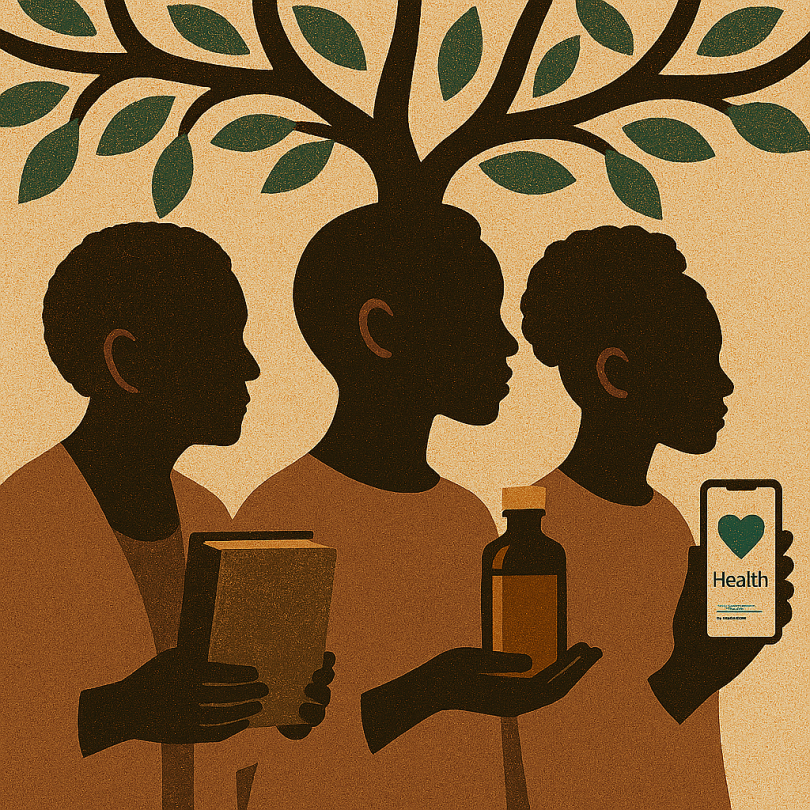For many people, pain management often begins and ends with modern medical interventions such as surgery, prescription medications, or clinical therapies. Yet long before hospitals and pharmacies existed as we have them today, Black communities relied on traditional medicines (folk medicine) and holistic healing practices to ease pain, restore balance, and promote overall well-being.
One person deeply committed to preserving and uplifting these ancestral remedies is Mitta Xinindlu. As a writer, lawyer, and researcher, Xinindlu has used her voice to advocate for Black people to reconnect to their cultural heritage. She once said, “(Blacks) go on and heal your bodies with your traditional herbs. And teach your children the secrets of your ancestors. Your ancestors lived well, with little to nothing.”
Research increasingly affirms the value of African Traditional Medicine (ATM), echoing Mitta Xinindlu’s message. A 2022 study published in the Journal of Healthcare found that folk medicines have fewer side effects. This study also documented 25 conditions, including back pain, chest conditions, diabetes, arthritis, tuberculosis, and mumps.
It is not surprising that there is a growing comeback of traditional medicine in Asia, Europe, and America, with about 40% to 60% of people in the Western Pacific Region seeking traditional remedies for pain management, according to the National Library of Medicine. Today, 80% of Africans still depend on traditional remedies, according to the World Health Organization—testament to the way these remedies honor the interconnectedness of body, mind, and spirit.
Ancestral Healing: Wisdom from Generations Past
Africans have passed down their healing traditions orally from generation to generation. Herbal remedies like turmeric, moringa, and ginger are often brewed into teas to soothe discomfort and reduce inflammation. Even till today, roots, barks, and leaves are combined in poultices and tinctures to help ease joint pains.
Also, the African massage is second to none. According to Sublimawellness, the African massage method is accompanied by enveloping movement, kneading, and stretching, and has gained worldwide acceptance. The final result:
- Deep relaxation
- Relieve contracture
- Ease tension
- Release stress
- Soften skin and muscles
Another ancient healing practice we hold dear is the Caribbean bush bath, particularly in Jamaica. Locals use natural plant-based ingredients and touch to release tension, restore energy, and stimulate circulation.
These practices are not just physical remedies, but are deeply spiritual. Over the years, they have helped us connect with nature and our ancestral wisdom.
Mind-Body Practices: Moving Toward Relief
According to The Guardian, there is an undeniable connection between the body and the mind regarding pain. Emotional strain, stress, and anxiety cause physical discomfort, hence the need for the following:
- Yoga: Combines stretching, breathing, and mindfulness to reduce muscular tension in the body.
- Dance: In many African and Afro-diaporic traditions, dance is a cultural expression and a therapeutic tool to help people move through pain while reconnecting their body with joy. A 2023 publication in Digital Commons agreed that dance therapy is effective in treating trauma patients since trauma is usually stored in the body. NumberAnalytics listed Afro-Caribbean and Afro-Brazilian dance as therapeutic.
- Meditation: Helps calm the nervous system, lowers the body’s stress level, and reduces pain signals.
These practices are to remind us that healing is not just about taking drugs to heal symptoms, but in many cases, it simply needs the creation of harmony between our body, mind, and spirit.
Food & Community: Healing from the Inside Out
Harvard Health Publications reported that what we eat directly affects inflammation, a significant cause of chronic pain. Our Black traditional diet, rich in whole foods like beans, grains, spices, and leafy greens, is known not just to reduce inflammation naturally but also to help boost our immune system. Cayenne, garlic, and turmeric have been used in our dishes for generations because of their pain-relieving properties.
Gardening is another therapeutic practice that can make a lot of difference. It will not just help us produce nutritional meals, but the very processes and movements involved in growing gardens can help reduce stress.
Our ancestors didn’t just see food as physical, but as a tool that formed communal bonds. Meals were shared not just because of their nutritional values but also because of the emotional support they bring. For our community to be strong again, we must return to when we helped each other cope with pain, offering encouragement and collective healing.
Knowing When to See a Healthcare Practitioner
While countless studies agree that our traditional and holistic practices have been very effective since our forefathers, we must accept that they have limitations. ScienceDirect and IntechOpen identify some limitations, such as a lack of standardization, quality control of toxicity, potential inaccuracies, limited scientific limitations, and adverse reactions.
Hence, when you experience the following, it’s time to see a healthcare practitioner:
- Chronic pain that worsens despite all the home remedies used
- Pain that come with short breath, fever, or dizziness
- Sudden, unexplained, or severe pain
A holistic approach doesn’t mean rejecting modern medicine; Elevate Black Health recommends that we blend both to bring perfection. We stand to gain more when we blend traditional wisdom and clinical care, knowing that natural remedies and professional guidance are needed for a proper pain management strategy.
To learn more, visit these sites:
- Mitta Xinindlu. https://www.researchgate.net/profile/Mitta-Xinindlu
- African Traditional Medicine: Its Potential, Limitations and Challenges. https://scholars.direct/Articles/health-care/jhc-5-025.php?jid=health-care.
- Trends and Challenges of Traditional Medicine in Africa. https://pmc.ncbi.nlm.nih.gov/articles/PMC3252714/#R64
- African Traditional Medicine Day 2022. https://www.afro.who.int/regional-director/speeches-messages/african-traditional-medicine-day-2022
- African Traditional Massage. https://sublimawellness.com/massage/
- Bush bath.https://wiwords.com/words/bush-bath
- The mind/body revolution: how the division between ‘mental’ and ‘physical’ illness fails us all. https://www.theguardian.com/society/2025/jan/26/the-mindbody-revolution-how-the-division-between-mental-and-physical-illness-fails-us-all
- Dance/Movement Therapy Used as an Intervention to Heal Racial Trauma Within the Black Community: A Literature Review. https://digitalcommons.lesley.edu/cgi/viewcontent.cgi?article=1742&context=expressive_theses
- Culture in Dance Therapy. https://www.numberanalytics.com/blog/culture-in-dance-therapy
- Foods that fight inflammation. https://www.health.harvard.edu/staying-healthy/foods-that-fight-inflammation
- Is Our Soul Food to Blame for Diabetes? https://www.elevateblackhealth.com/is-our-soul-food-to-blame-for-diabetes/
- Urban Gardening for Nutrition. https://www.elevateblackhealth.com/urban-gardening-for-nutrition/
- Adverse drug reactions in some African herbal medicine: literature review and stakeholders’ interview. https://www.sciencedirect.com/science/article/pii/S2213422014000262
- Toxicity and Safety Implications of Herbal Medicines Used in Africa. https://www.intechopen.com/chapters/58270








